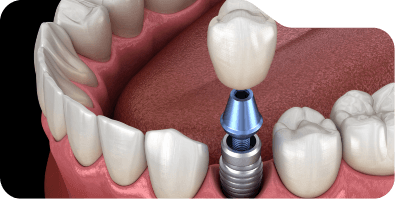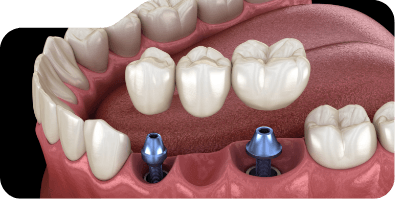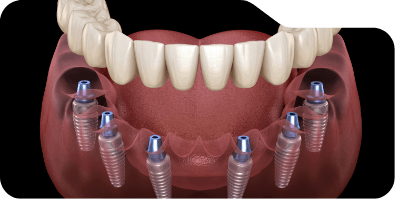Dental Implants – Grand Prairie, TX
Replacement Teeth That Mimic Nature

Whether you’re missing one, several, or all of your teeth, dental implants can rejuvenate your smile so it functions and looks better than ever. Due to Deepti Namineni advanced training in this procedure, our team can complete the entire dental implant process under one roof, and we even offer same-day tooth replacements depending on your needs. We also take pride in our competitive prices, allowing you to restore your mouth at a manageable cost. Call us today to schedule a dental implant consultation and learn more about this leading-edge tooth loss treatment!
Why Choose The Grand Prairie Dentist for Dental Implants?
- Affordable Same-Day Dental Implants
- Start-to-Finish Implant Treatment In-House
- CT/Cone Beam Scanner Used for Advanced Treatment Planning
What Are Dental Implants?

Dental implants themselves are small titanium posts that are surgically placed below the gumline and into the jawbone to replace the root structure of missing teeth. The posts can be made from several different biocompatible materials, including titanium, ceramic, and zirconia, and can naturally fuse with the bone to provide a strong and steady foundation for a dental bridge, crown, or denture. The result is unwavering replacement teeth that look and feel completely natural.
The 4-Step Dental Implant Process

Getting dental implants requires a multi-step process that takes several months. This might seem like a long time, but the long-term benefits you will experience with your new teeth are well worth the time and effort. At The Grand Prairie Dentist, we are proud to complete the entire dental implant process in our practice, so there is no need to refer you to an outside specialist at another location. Every patient’s treatment looks a little bit different, but here are the four main steps that you can expect.
Initial Dental Implant Consultation

During your consultation, our team will use our cone beam CT scanner and other digital diagnostic technology to gather a comprehensive view of your dental structure. We’ll also conduct a thorough examination and go over your medical history before speaking with you about your smile goals. Based on everything we discuss, we’ll create a customized treatment plan. During this appointment, we will walk you through what you can expect step-by-step, including the timeline and cost of your treatment.
Dental Implant Surgery

Due to the advanced training of our implant dentists, we’re able to complete the placement of your implants in-office, so you won’t have to worry about traveling to see a different specialist. We will begin by numbing the area with a local anesthetic so that you don’t feel a thing. Sedation options are also available. Then, we will make an incision in the gums and place the implant posts. Afterward, the gums will be closed, and protective caps will be placed over the posts to keep them safe throughout the healing process.
Dental Implant Osseointegration & Abutment Placement

After your surgery, your implants will fuse to your jawbone through a fusion process called osseointegration, which can take between three and six months. After this is complete, we’ll secure small metal connector pieces onto your implants, called abutments. Your final restoration will be crafted using impressions taken of your mouth.
Delivery of Dental Implant Restorations

When we receive your final prosthetic, we’ll have you come back in for the last part of your treatment, which will be to secure the replacement teeth to your implants and abutments and complete your smile. At this time, we will check to make sure your bite is comfortable and everything looks as it should. Then, you can enjoy all of the exciting benefits of your new pearly whites!
Benefits of Dental Implants

Dental implants go beyond simply replacing the visible part of missing teeth – they also address the hidden root structure and jawbone beneath the gums' surface. This comprehensive approach offers numerous benefits for eligible patients, including a natural look and feel, as well as enhanced security. If you qualify for this treatment, you should seriously consider getting dental implants. Simply click on the button below to learn more about the incredible advantages!
Day-to-Day Benefits

Even though dental implants are a sophisticated dental treatment, their maintenance is surprisingly straightforward. Unlike dentures (which require nightly soaking), implants require the same daily care as natural teeth. Regular brushing and flossing, along with routine dental checkups and cleanings, will help ensure your implants stay in excellent condition.
Plus, since implants are securely anchored in the jawbone, the prosthetic teeth offer superior stability and strength. You will be able to comfortably bite, chew, and enjoy your favorite foods! Because there's no need to worry about teeth slipping out of place, you can eat and smile with full confidence.
Health Benefits

The roots of your natural teeth stimulate the jawbone, encouraging new growth and providing strong support for your teeth. Unfortunately, when a tooth is lost, the jawbone starts losing density. Since dentures or bridges don't do anything to prevent this, it leads to a sunken and aged appearance.
Fortunately, dental implants preserve your natural facial structure and stop jawbone deterioration. With sturdy teeth and a healthy jawbone, you can enjoy a nutritious diet of fruits and vegetables, enhancing your overall quality of life and potentially extending your life expectancy!
Long-Term Benefits

Did you know that dental implants last much longer than traditional dentures or bridges by a lot? With proper care, dental implants can continue to function effectively even after 30 years. On the other hand, dentures require adjustments every year and replacement approximately every 5 to 7 years, while bridges typically last around 7 to 10 years at best. When you crunch the numbers and consider the costs of replacements, you might find that implants are a wise long-term investment compared to more conventional alternatives.
Who Dental Implants Can Help
Dental implants are an incredibly versatile treatment with the ability to restore any number of missing teeth. However, the best way to learn whether this treatment is right for you is to schedule a consultation with our team. Based on your unique tooth loss situation and whether you have enough jawbone density to support the implants, we’ll be able to outline all of your options so you can choose the one that will offer you the best results.
Missing One Tooth

For a single missing tooth, we can secure one dental implant below the gumline. Once it has undergone the process of osseointegration and fused with the jawbone, we’ll be able to secure an abutment to it, followed by a customized dental crown to fill the gap in your arch.
Missing Multiple Teeth

To restore several missing teeth in a row, we can secure a dental bridge to two or more implants placed throughout the gap. These will act as abutments instead of your natural teeth, making the process less invasive than receiving a traditional bridge.
Missing All of Your Teeth

Our team offers traditional implant dentures as well as Teeth-in-a-Day, or All-on-4 implant dentures. These combine the aesthetic benefits of dentures with the security of anywhere between four and eight dental implants placed throughout your arch to hold them in place, eliminating any slipping or shifting.
Understanding the Cost of Dental Implants

Every dental implant case is custom-tailored to our patient’s individual needs, so we typically don’t know the cost of restoring your smile until we’ve had a chance to examine your mouth and determine some important factors, like how many implants you’ll need to have placed. Based on these details, we’ll provide you with a cost estimate of your procedure that we’ll walk you through, along with all of your payment options. At The Grand Prairie Dentist, we’re proud to accept all PPO dental insurance plans as well as financing through CareCredit.
Dental Implants Post-Op Instructions

After you’ve undergone your dental implant placement surgery, you’ll need to focus on your recovery period to ensure a successful treatment. Before and after your procedure, our team will provide you with a specific set of guidelines that you’ll need to follow so that you can make the healing process go as smoothly as possible. Until then, here are the common dental implant post-op instructions you can expect.
What to Do Directly After Dental Implant Surgery

Right after leaving your appointment, you’ll want to go home and get plenty of rest so that you can maximize your recovery. The main priority will be to allow the blood clot to form around the implant site, which is essential for both osseointegration and to avoid infection. To help keep it safe, you’ll want to follow these tips:
- Avoid touching the surgical site with your tongue or fingers
- Refrain from spitting; swallow your saliva or use a tissue
- Do not use a straw when drinking any fluids
- Stay away from smoking or using any tobacco products after the procedure
Common Side Effects When Recovering from Dental Implant Placement

Some of the typical side effects that you might experience after dental implant surgery include:
- Discomfort: It’s normal to feel soreness or tenderness following your procedure. Fortunately, this can be managed with over-the-counter or prescribed pain relievers.
- Inflammation: For the first few days, you might experience some swelling around the implant site. Try minimizing this with a cold compress.
- Bleeding: Intermittent bleeding can happen while the blood clot is forming. Make sure to use gauze or a clean cloth to control it if it occurs.
Your Diet After Dental Implant Surgery

After your surgery, you’ll want to stick to soft foods that don’t require much chewing. These can involve:
- Scrambled eggs
- Yogurt
- Pudding
- Applesauce
- Warm or cold soup
- Mashed potatoes
- Ice cream
Post-Op Health & Oral Hygiene

About 24 hours after your implant surgery, you should be able to start brushing your teeth like normal. Just make sure to be careful around the surgical site to not disturb the blood clot. Rinse your mouth frequently with salt water to help sanitize the area and reduce the risk of bacteria and infection. Avoid using mouthwash containing alcohol, as this can cause discomfort in the area.
What to Do After Your New Teeth Are Attached

Once you’ve received your new dental crown, bridge, or denture, you’ll be free to make the most of your fully rebuilt smile! You might feel some sensitivity after having your restoration attached, but this can easily be managed with pain medication. There should also not be any swelling, bleeding, or recovery extension. If there is, get in touch with our team as soon as possible so we can address the issue.
Maintaining & Caring for Your Dental Implants

Although dental implants are crafted from only the best materials and have an extremely high success rate, they won’t last long if you don’t take good care of your smile. In this next section, we’re sharing helpful information about your oral hygiene regimen, your diet, and more. However, don’t hesitate to reach out to us if you have any questions about maintenance – from how often you should come to our office for checkups to which toothbrush is best for you.
Make Oral Hygiene a Priority

Have you heard of peri-implantitis? It’s a form of gum disease, and it’s one of the leading causes of dental implant failure. For that reason, patients are encouraged to commit to a solid oral hygiene regimen before, during, and after their procedure. That starts with the basics, like brushing consistently, and extends to other healthy habits, like switching your toothbrush every quarter and rinsing with antimicrobial mouthwash consistently.
Eat a Healthy Diet

Simply put, your diet impacts your oral health! To ensure your body has the vitamins, nutrients, and minerals it needs to keep your jawbone strong and fight off infections, you need to fill your plate with foods like cooked carrots, bananas, egg whites, oatmeal, and plain yogurt. It’s also important to keep your consumption of added sugar to a minimum; soda, candy, and other sugary treats can quickly lead to cavities!
Break Bad Habits

Over the years, have you adopted an unhealthy habit or two? If so, it’s important that you quit! After all, biting your nails, chewing on the back of your pencil, and clenching your teeth when you’re stressed might seem harmless, but they can damage your dental implants and your teeth. That’s why we recommend opting for healthier alternatives, like squeezing a stress ball.
Note: If you need recommendations, don’t hesitate to reach out to us – we’re here to help you!
Protect Your Dental Implants

Chips, cracks, and other forms of damage can be painful to experience, stressful to handle, and costly to fix. That’s why it’s so important to do what you can to protect your dental implants from harm. One example is wearing a nightguard if you clench or grind your teeth at night. Another is wearing a mouthguard if you participate in sports (including non-contact ones). These may seem small, but they play a big role in preserving the look, health, and function of your new smile.
Schedule Regular Dental Checkups

There’s a common misconception that dental checkups aren’t necessary with dental implants since they can’t decay. That’s not the case! After all, your gums are still vulnerable to infections, and any remaining natural teeth you have can still develop cavities. Plus, we look for non-dental issues during your routine exams, including oral cancer. So – whether you are only missing one tooth, or you don’t have any of your natural teeth left – make your biannual appointments with us a priority.
Dental Implant Failure & Salvage

One of the exciting benefits of dental implants is that they have a success rate of over 95%! This means that dental implant failure is highly unlikely. However, it is still possible, so it’s important to always be on the lookout for signs that your implants are struggling. If you notice that your implant is loose or uncomfortable, or you have another concern about it, don’t hesitate to contact us. We may be able to save your implant with dental implant salvage treatment.
Learn More About Dental Implant Failure & Salvage
Dental Implant FAQs
Are Dental Implants Safe?
Dental implants have an incredibly high success rate when placed by a professional, and the surgery itself is fairly low impact. This means that for most people dental implant surgery is completely safe.
The only possible exceptions are those people who are currently dealing with serious oral health problems, or who have medical conditions that could significantly delay healing. In these cases, we will work with you to rectify these issues before pursuing a dental implant procedure.
How Can I Tell If My Dental Implant Is Failing?
While dental implants are one of the most incredibly successful methods of tooth replacement, there are some instances where it’s possible for a dental implant to fail. This is typically due to infection. If you find that the area around your dental implant is swollen, inflamed, and painful, this is often indicative of impending failure. Toward the end stage of potential failure, you may also find that your dental implant feels loose in the mouth.
Will I Have to Take Off Work for Dental Implant Surgery?
Dental implant surgery is incredibly low-impact, which means that most people need to only take one or two days off after the surgery. While every case is different and we’ll be able to give you a better timeline once we know you well, most people will have to take off one day at worse.
However, it is recommended that you refrain from vigorous exercise for a few days after the treatment is done, which means that you might have to take more time off if your job involves manual labor.
Do Dental Implants Feel Natural?
Dental implants are attached securely to the jaw, just like natural teeth. They’re also made of incredible materials and will be customized to perfectly fit your smile, meaning that they’ll look wonderful as well. All this is to say that you can count on your dental implants looking and feeling completely natural, so much so that you will likely even forget they’re there after a certain amount of time.
